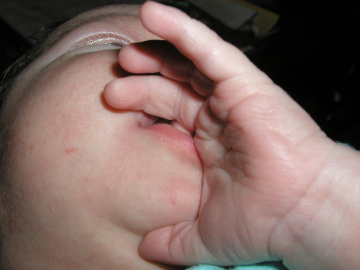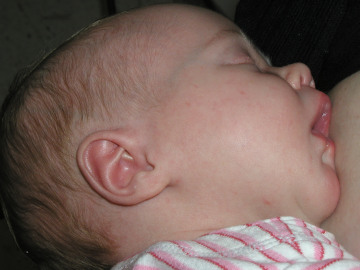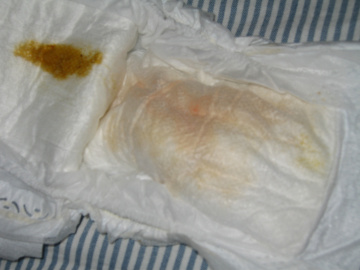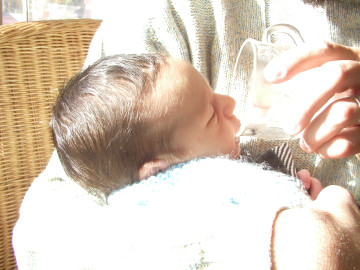
Parents worry their baby isn't get enough milk when they seem to breastfeed constantly. Answering some simple questions can help reassure you or let you know to get breastfeeding help.
1. Is the baby having wet and dirty diapers?
New babies should have at least one wet and one poopy diaper for each day of life. One each on day 1, two each on day 2, 3 each on day 3. Poops start out thick and dark (see figure 1), and gradually become yellow, soft and more liquid with little curds by day 4-5.
By 5 days old, breastfed babies should have 5-6 wet diapers and 5 or more poops at least the size of a US quarter coin (or a euro or Canadian "loonie", or an Australian 2 dollar coin). Some babies have fewer but bigger stools.
2. Is baby relaxed after feeding?
On the second day of life, most babies breastfeed constantly to help increase the milk production. Babies bring their hands to their mouth when they are hungry (see figure 2).

Other than a single day of "feeding frenzy" on the second or third day of life, babies should relax and fall asleep after nursing. As they get a little bigger, they let go of the breast and either look for the other breast or put their head down to rest on you (see figure 3). So cute!

3. Does baby wake up to nurse?
Some newborns need a little help to wake up to feed. Holding them skin to skin (baby in a diaper, you topless, a blanket over baby's back if it's chilly) helps them wake up and smell the coffee, er, milk. It's actually a good sign if your baby wakes up every couple of hours, with one longer stretch of about 4 hours a day.
If the answer to all three questions was yes, all is probably fine. See this cool youtube video for what's normal: https://www.youtube.com/watch?v=Brhq-Z11zos.
If your baby is very sleepy and doesn't wake up to nurse, is having few poopy diapers (or only little skidmarks of stool or orange urine after day 3 - see figure 4), or cries every time he or she comes off the breast, get help!

Many International Board Certified Lactation Consultants (IBCLCs) are doing virtual consultations for new families during social isolation. You can visit http://www.nylca.org for help in NYC.
La Leche League Leaders are available on the telephone and some are having virtual meetings. More information can be found at LLLofqueens.com.
While you work to get help, try expressing extra milk and feeding with a spoon (see figure 5) or cup (see figure 6).See the links for parents for ways to get milk out with your own hand.



